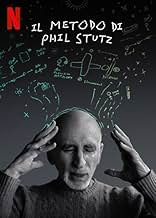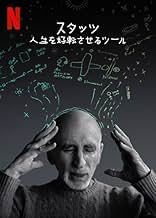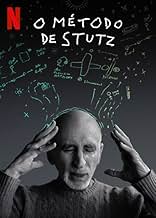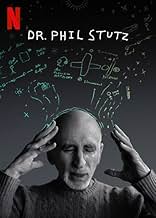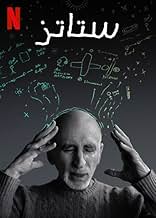CALIFICACIÓN DE IMDb
7.7/10
19 k
TU CALIFICACIÓN
En conversaciones con el actor Jonah Hill, el psiquiatra Phil Stutz explora sus primeras experiencias y un singular modelo terapéutico visual.En conversaciones con el actor Jonah Hill, el psiquiatra Phil Stutz explora sus primeras experiencias y un singular modelo terapéutico visual.En conversaciones con el actor Jonah Hill, el psiquiatra Phil Stutz explora sus primeras experiencias y un singular modelo terapéutico visual.
- Dirección
- Elenco
Resumen
Reviewers say 'Stutz' is a profound documentary delving into Jonah Hill's therapeutic journey with Phil Stutz, emphasizing mental health and vulnerability. It underscores the significance of open dialogue, self-acceptance, and practical therapeutic methods. Audiences value its raw honesty, valuable insights, and emotional resonance. While some critics point out pacing inconsistencies and moments of detachment, 'Stutz' is widely praised for its authentic take on mental health and its capacity to motivate viewers towards positive transformation.
Opiniones destacadas
This is a beautiful film. The goal of helping people by sharing Stutz methods, has at least in my case, been met. I love that the film actually contains tools and actions that a person can use. As you watch, you can follow along with exercises that Stutz asks Jonah to do. The relationship between Jonah and Stutz is really special and as a viewer it feels like you're seeing them both so vulnerable and intimate. There is a real sense of honesty throughout. I also really enjoyed the visual aspects of the film. The film also has the perfect amount of humour. I will be rewatching this film and would definitely recommend it.
Such a thought provoking and powerful documentary, that has personally given me some excellent tools to use in life; and help me work through issues from the past myself. Many different issues are explained simply and approaches detailed that are easy to follow and incorporate daily.
Although the documentary wasn't about me at all, I could really relate to so much throughout. Simple and enjoyable watch that was easy to follow and real in content.
Really grateful that this documentary was made for the difference it will make to many peoples lives, and a great view of your lives and strong bond that is captured forever.
Although the documentary wasn't about me at all, I could really relate to so much throughout. Simple and enjoyable watch that was easy to follow and real in content.
Really grateful that this documentary was made for the difference it will make to many peoples lives, and a great view of your lives and strong bond that is captured forever.
Dr. Stutz's eclecticism is what makes him a formidable therapist. He was schooled in psychoanalytic theory, but has blended cognitive behavioral therapy, mindfulness and acceptance into a simple yet potent formula to follow.
Step 1: Identify your Part X, a.k.a. Your inner saboteur. These are all the negative messages about yourself from society, community and family that you have internalised. They form barricades that prevent you from reaching your goals and attaining self-actualisaton.
Step 2: Befriend your Shadow. Most people try to run away from their shadow yet the shadow is irrevocably a part of them. It is the side of you that you are the most ashamed of and the reason you are ashamed of it is Part X, the negative messaging. Be compassionate to the shadow by refuting Part X and loving all parts of yourself.
Step 3: Beware the Snapshot. The snapshot is the thing that we think will finally bring us happiness once we have achieved it, and make up for past hurts and disappointments. Hill thought it was fame and success for him but soon plunged into depression when he realised that it did not make his shadow go away. The snapshot is a diversion.
Step 4: Get out of the Maze. This is us holding onto old grievances, demanding that life should be fair when it is not. It keeps us stuck in the past, unable to enjoy life in the present, and contaminates the future. To get out of the Maze, Stutz advocates for Active Love.
Step 5: Exercise Active Love. Embody the love that you wish to receive from the universe and project it onto those who have done you wrong so that you may forgive them for their actions. This is exercising kindness for yourself and empathy for those who have been responsible for your Part X, finally allowing yourself to let go and move on.
Step 6: Use Radical Acceptance. Try not to resist your negative thoughts and feelings. Whatever happens when you get told not to think about a pink elephant? Instead acknowledge the pink elephant, tell it kindly that you will not engage with it and turn your attention to something more productive and rewarding.
Step 7: Practice the Grateful Flow. Surmount Part X by reminding yourself the things that you are grateful for in life, no matter how big or small. This is like a mindfulness practice in that it helps us to ground ourselves and not be carried away by the incessant negative messages from the world.
Stutz says that his biggest fear is not getting enough done before he dies. He has a website offering The Tools, but there is probably an opportunity for a book like the Happiness Trap, which takes people through the steps of Acceptance and Commitment Therapy (ACT).
Step 1: Identify your Part X, a.k.a. Your inner saboteur. These are all the negative messages about yourself from society, community and family that you have internalised. They form barricades that prevent you from reaching your goals and attaining self-actualisaton.
Step 2: Befriend your Shadow. Most people try to run away from their shadow yet the shadow is irrevocably a part of them. It is the side of you that you are the most ashamed of and the reason you are ashamed of it is Part X, the negative messaging. Be compassionate to the shadow by refuting Part X and loving all parts of yourself.
Step 3: Beware the Snapshot. The snapshot is the thing that we think will finally bring us happiness once we have achieved it, and make up for past hurts and disappointments. Hill thought it was fame and success for him but soon plunged into depression when he realised that it did not make his shadow go away. The snapshot is a diversion.
Step 4: Get out of the Maze. This is us holding onto old grievances, demanding that life should be fair when it is not. It keeps us stuck in the past, unable to enjoy life in the present, and contaminates the future. To get out of the Maze, Stutz advocates for Active Love.
Step 5: Exercise Active Love. Embody the love that you wish to receive from the universe and project it onto those who have done you wrong so that you may forgive them for their actions. This is exercising kindness for yourself and empathy for those who have been responsible for your Part X, finally allowing yourself to let go and move on.
Step 6: Use Radical Acceptance. Try not to resist your negative thoughts and feelings. Whatever happens when you get told not to think about a pink elephant? Instead acknowledge the pink elephant, tell it kindly that you will not engage with it and turn your attention to something more productive and rewarding.
Step 7: Practice the Grateful Flow. Surmount Part X by reminding yourself the things that you are grateful for in life, no matter how big or small. This is like a mindfulness practice in that it helps us to ground ourselves and not be carried away by the incessant negative messages from the world.
Stutz says that his biggest fear is not getting enough done before he dies. He has a website offering The Tools, but there is probably an opportunity for a book like the Happiness Trap, which takes people through the steps of Acceptance and Commitment Therapy (ACT).
I don't go to therapy. But this was kind of like going to a therapist. I paused it at several points to think about my answers (for instance my shadow). It made me think a lot about things I haven't let myself focus on and it was helpful to address those things internally and this gave me an outlet to do that. I appreciate the honesty shown by both Jonah and his therapist. Great job, great film. So rare to see truth captured like this I was really surprised how much I enjoyed it. Even if therapy isn't your thing I recommend giving this a shot I think it would surprise even the biggest cynic. The tools given are really life changing again I'm super grateful this was made.
It has been my experience that smart people seek out therapy. Further, highly intelligent people need therapy. Unfortunately the topic of therapy is taboo in the Unites States. If you think you may need therapy the chances are that you do. If you are confused about, can't find, afford or commit to finding a therapist this documentary is a great place to start. IMHO (in my humble opinion).
While I'm not a therapist I have benefitted by seeing a therapist a few times during my 62 years on the planet and recognize the value in using the tools described in this documentary. It's relevant and not difficult or hard to watch. I applaud Mr. Hill for having the courage in making this documentary and want to thank Mr. Stutz for his insight and wisdom.
While I'm not a therapist I have benefitted by seeing a therapist a few times during my 62 years on the planet and recognize the value in using the tools described in this documentary. It's relevant and not difficult or hard to watch. I applaud Mr. Hill for having the courage in making this documentary and want to thank Mr. Stutz for his insight and wisdom.
¿Sabías que…?
- TriviaPhil Stutz wrote a book called The Tools published in 2013 explaining how to apply the techniques Jonah highlights in the film.
- Citas
Phil Stutz: You don't get to the world of meaning through big things. You get it through small things.
- ConexionesReferenced in Film Junk Podcast: Episode 873: Terrifier 2 (2022)
Selecciones populares
Inicia sesión para calificar y agrega a la lista de videos para obtener recomendaciones personalizadas
- How long is Stutz?Con tecnología de Alexa
Detalles
- Tiempo de ejecución
- 1h 36min(96 min)
- Color
- Mezcla de sonido
- Relación de aspecto
- 1.78 : 1
Contribuir a esta página
Sugiere una edición o agrega el contenido que falta



